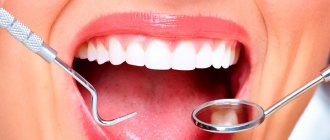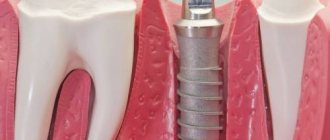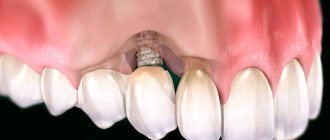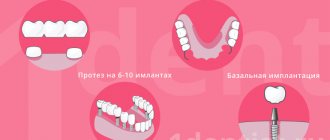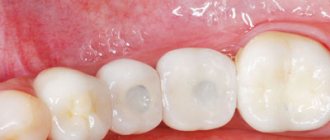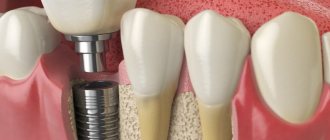Question #1: What is an implant?
Implant (or implant) is an artificial titanium pin (root) that is screwed into the hard jaw bone, thereby replacing the natural tooth root. The implant also includes an abutment (connecting link) and the crown itself, which performs the functions of a tooth. This is a ready-made solution that can completely replace your dental unit - in function, appearance and feel. The main advantage of the implant is that it can stand “independently”, that is, unlike the same bridge, neighboring teeth are not cut down.
Using an implant, you can restore one, two or more teeth in a row, as well as at least all 32 units. The implant can also serve as a support for a future denture (for example, as is the case with the All-on-4 or All-on-6 systems).
Do they install a full set of implants to replace all missing teeth?
Sometimes patients want to resort to full implantation - and dentists can accommodate this wish. However, in this case, not 32 teeth are implanted (that is, not 16 in each dentition), but 28 - 14 implants on top and bottom. The “wisdom teeth”—the eighth, outer ones—turn out to be irreplaceable. The reason for this is that the edge of the human jaw bone has a device that is unfavorable for implantation - that is, it may simply not be enough for a pin. But since the “eights” of the vast majority of people are not part of the smile area and do not bear the chewing load, it is not necessary to restore them - neither aesthetics nor functionality will suffer from this.
It happens that they get by with just 12 implants - and “overlook” the second molars, since some people have a jaw shape and appearance features (the oval of the face, the width of the smile) that allow such a replacement to be performed without compromising the naturalness.
However, it is worth understanding that complete replacement with implants is the most expensive option. In addition, even if the patient is financially and morally ready to undergo implantation of all teeth, bone characteristics (insufficiency of the jaw bone at certain points), peculiarities of the location of nerve fibers in the gum tissue, etc. factors can become an obstacle. Only based on the results of the examination at the VivaDent clinic can they say whether it is possible to prepare the jaw for 14 or 12 implants using one method or another - or whether this is completely undesirable.
Question 2: Are there any contraindications for the implantation procedure?
Yes, I have. But every year there are fewer and fewer of them. Dentistry is rapidly developing, trying to make implantation more accessible, including to those people who could have been denied such manipulation just a few years ago.
The following are considered absolute contraindications:
- diseases of the central nervous system;
- severe forms of diabetes;
- cancerous tumors;
- systemic bone lesions.
Relative contraindications include:
- viral infections and inflammatory processes;
- pregnancy and lactation;
- poor oral hygiene.
ALL-ON-4, ALL-ON-6 technology
A patient who has completely or largely lost his teeth experiences enormous moral pressure, which over time can even transform into a type of complex such as dentophobia - the fear of everything related to teeth. The process of eating, talking in public, not to mention the ability to smile, turns into emotional torture for such people, which is difficult for others to understand. Against the background of dental problems, a person becomes sociopathic, withdrawn and emotionally unstable. Only high-quality prosthetics, which will be comfortable, unnoticeable and will give the patient confidence that no one will know about his problem, solves this serious problem.
Question 3: Is it possible to place an implant immediately after tooth extraction?
Yes, you can. This procedure is called one-stage implantation, when a titanium root is implanted immediately after the extraction of its tooth. But there is one important condition here - the patient must have enough volume of hard bone for the pin to be successfully implanted and take root. If there is a lack of bone tissue, then most likely the surgeon will offer a classic scheme with preliminary bone augmentation.
The presence of inflammation also plays a role. If an inflammatory process is diagnosed in the area of the tooth being removed, the soft tissues are first treated, and only then preparations are made for the implantation of a new tooth.
It is important
! By saving a few months or “turning a blind eye” to inflammation, all the work to restore teeth may come to naught. It is much better to wait until the skeletal system and soft tissues are ready to accept the foreign body (and the implant is a foreign body) so that the process is completed with 100% success.
How is dental prosthetics performed using all-on-4 and all-on-6 technologies?
To carry out a prosthetic procedure on 4 or 6 implants, close cooperation and interaction of two specialists is required: a dental surgeon (implantologist) and an orthopedic dentist working in one team.
All surgical procedures are performed by a dental surgeon in a surgical office, on an outpatient basis, under local anesthesia; preliminary premedication may be used.
I Preparatory stage:
- Diagnostics.
The process of installing an implant-supported prosthesis is a serious multi-stage procedure, including surgical intervention, so the patient undergoes a thorough diagnosis. Before starting the procedure for installing a denture on implants, the patient must undergo diagnostics from the following specialists:
- Diagnosis by a surgeon
- Diagnostics by an orthopedist
- Assessment of periodontal condition (diagnosis by a periodontist) - may be required according to indications.
Often, before diagnosis, it is impossible to accurately determine which prosthetic protocol using these methods is most suitable for the patient. Based on the diagnostic results, the methodology is finally determined, and the implant surgeon determines the future locations for installing artificial implants.
- Drawing up a treatment plan that fully describes all the procedures necessary for the patient, stages of treatment and their predicted results. The terms are indicated and the FULL cost of treatment is calculated. The treatment plan is agreed upon and approved with the patient.
- Sanitation of the oral cavity - if it is decided to save some teeth, then they are treated and gum inflammation is treated, if this occurs.
- Making a surgical template. To do this, a 3D model of the patient’s jaw is created using X-rays and casts of the patient’s jaw; a special computer program simulates the entire process of installing implants and subsequent prosthetics. The jaw model is then cast from plastic and a surgical template is made from it.
II Surgical stage
- If, before installing implants, the patient needs to remove teeth that interfere with prosthetics, then they are removed right before implantation. The implants will be installed directly into the sockets of the extracted teeth.
- Implantation of artificial supports for a future orthopedic structure using the chosen technique.
- In the case of all-on-4, 4 implants are installed on the patient’s jaw, consisting of a titanium rod with a removable abutment (adapter) on which the prosthesis is attached: 2 - vertically in the central section, and 2 - at an angle of 30 to 45 degrees in the lateral sections dentition.
- In the case of all-on-6, 6 implants with an already solid abutment are installed on the patient’s jaw: 2 – vertically in the central part of the dentition, and 2 more – on each side, also at an angle.
- The area of contact with bone tissue increases.
- An implant can be installed when there is limited bone tissue.
- The implant allows you to replace the upper jaw without the need for a sinus lift, and at the same time avoids the risk of perforation of the maxillary sinus.
- Allows you to fix the prosthesis more firmly.
Why are all “4(6)” side implants placed at an angle during prosthetics? Placing lateral implants at an angle provides a number of advantages:
- In the case of all-on-4: when installing 4 implants, they can be loaded with a temporary prosthesis immediately, or within 2-3 days - at the discretion of the attending physician and at the request of the patient.
- In the case of all-on-6: In this case, the loading of the implants with the prosthesis is carried out after 2-3 days.
III Orthopedic stage
After the final strengthening of the implants in the bone, the orthopedic dentist takes impressions and uses them to make a permanent orthopedic structure, which is tried on, adjusted and installed on the implants, secured with screws. To make artificial teeth for a permanent prosthesis, various types of crowns can be used:
- metal-ceramic
- metal-free ceramics
- zirconium dioxide crowns.
What is best to choose in each specific case is decided by the orthopedic surgeon together with the patient.
Question 4: Is it possible to install several implants at once?
Yes, you can. But quantity plays a role. For example, surgeons place one or two artificial roots at a time.
It is always worth remembering that implantation is a surgical intervention and stress for the body. In order not to overload your health, the surgeon draws up an implantation calendar, where he clearly states the dates of operations. This will distribute the load on the body.
Note! There is no need to rush to insert all the missing teeth at the same time. Let this process be systematic. By waiting a few months, you will receive guarantees that the roots will take root reliably and withstand all the load that will fall on them.
Question 5: Are there any age restrictions?
There are practically no age restrictions for dental implantation. Implants are allowed to be placed in young patients after the final formation of the dental system (about 18 – 20 years), and in adults, teeth can be implanted at 70 and 90 years.
If a child under 18 years of age needs to place an artificial pin instead of a molar, the dentist may suggest using a temporary implant and after a while placing a permanent one.
Question 6: How painful is the implant procedure?
The procedure itself does not cause pain or discomfort. The patient is first given anesthesia, which completely removes the pain. During the process of inserting a titanium pin, a person can watch a movie, listen to music or an audio book - he will not feel any discomfort.
Pain may be bothersome after the anesthesia wears off. But for this, the dentist prescribes painkillers to the patient to relieve pain and general discomfort. The pain should completely subside 3 to 5 days after installation of the implant. If it continues and is accompanied by swelling and fever, you should definitely consult your doctor.
How is the implant installation procedure performed?
Despite the fact that some patients still imagine dental implantation as something very complicated and bloody, we can say for sure that the installation of dental implants today is an absolutely routine, predictable surgical procedure. In some cases, tooth extraction may take longer and be more difficult. Even though many people have had their teeth removed at least once in their lives, an inexplicable fear of implantation still remains. Why? Probably because it is human nature to be afraid of something unfamiliar. That’s why it’s worth talking about how the standard implant installation procedure goes. Just in case for impressionable readers, I will avoid naturalism in matters of surgery, so we will limit ourselves to only diagrams and animation videos.
So, dental implantation is, I must say, very simple. You can easily verify this by viewing a short, schematic animated example.
{youtube}_wGvcbJXX2s{/youtube}
All this takes an experienced doctor 15-20 minutes of working time. Sometimes the surgeon has to deal with a stuck wisdom tooth for much longer.
It should be noted that during implant installation, it is very important that the surgeon uses good modern equipment and not too old drilling cutters. Lack of cooling, sloppy work, use of blunt tools (they need to be renewed quite often) - all this can lead to failure, i.e. The “screw” simply does not integrate into the bone. If the implant “rejected” even before its prosthetics, then almost certainly a mistake was made somewhere. With rare exceptions.
Question 7: Is it possible to perform implantation under anesthesia?
Yes, you can. Sometimes implantation is recommended for the patient under general anesthesia, namely in the following cases:
- if the patient is allergic to anesthetics used for local anesthesia;
- in cases where the patient may have a persistent gag reflex during intervention in the oral cavity;
- if there are disorders of the nervous system for which dental implantation is allowed;
- with changes in the functioning of the immune system;
- if bone augmentation is intended, and it is first taken from the pre-iliac or parietal zones;
- in cases where 4 or more artificial roots are implanted into the patient during one visit;
- if it is necessary to simultaneously solve other dental problems that require general anesthesia.
In all other cases, classical local anesthesia or local anesthesia with intravenous sedation is sufficient.
Contraindications to implantation: questions and answers
It’s nice to know that there are fewer restrictions on dental implantation every year, because technology is actively developing. Doctors have the opportunity to use modern implant models created from pure titanium with an active surface and hydrophilic properties, which improves the rate of bone tissue cell restoration.
It is possible to use the patient’s own blood plasma, which reduces almost any risk of non-engraftment of the structures. And, of course, the first place comes to the possibility of carrying out high-quality planning, from studying the condition of the bone tissue in 3D to completely modeling the entire treatment process - choosing a place in the bone for implants, as well as creating a beautiful smile using software (we use Digital smile design).
We have prepared a selection of the most common cases when you think that implantation is impossible, and we not only carry out, but also give a lifetime guarantee for treatment. Of course, in complex cases, we place maximum emphasis on diagnosis and preparation, and often carry out treatment under the supervision of highly specialized doctors (endocrinologist, immunologist, etc.)
What is the minimum age for dental implantation?
Unfortunately, today tooth decay and loss are becoming more common in young patients - it is not uncommon for people aged 40-45 years and even younger to resort to dental implants. As for age restrictions, the minimum limit is 18 years (the patient is an adult, the jaw bone is fully formed, the bones are dense, the remaining teeth will not move). But there is no maximum limit: we perform implantation on both 70- and 80-year-old patients - the main thing is to have good health and eliminate contraindications.
Is it possible to undergo implantation in old age?
Can. Our many older patients consciously make a choice in favor of implantation methods with minimally invasive intervention, in which a fixed prosthesis is placed immediately: there is no need to perform several operations and there is no need to wait a long time for the installation of the prosthesis. You can enjoy life here and now.
It is always necessary to proceed solely from objective reasons, that is, to assess the health status of a particular patient. Regardless of age, the main thing is not to rush, assess possible risks and focus on quality preparation for treatment.
Anatoly Ivanovich, 74 years old
“Only four days and I was able to bite!!! I went to many clinics, but I stayed here. The operation was carried out under anesthesia, I did not feel anything and everything went smoothly and painlessly. And the wonderful thing is that now I can smile beautifully, I have changed - and all my loved ones noticed it. Thanks to all the doctors who created my new smile!”
- complete restoration of bite
- the opportunity is available immediately and everything is almost without restrictions
- beautiful smile and self-confidence
- instant prosthetics and minimum contraindications
watch a video with the patient
Is it possible to undergo implantation if you have diabetes?
In diabetes mellitus, irreversible metabolic disorders occur and bone density changes. However, as our own practice and numerous clinical studies3 show, if diabetes mellitus is controlled, then dental implantation can be performed. Moreover, such patients more often than others are faced with the problem of complete or almost complete absence of teeth, that is, with their early loss.
What we pay attention to when our patients have diabetes:
- in patients with type 2 diabetes, the risks of implant failure are lower, since the bone tissue is less discharged,
- Implantation is allowed only in patients with a compensated stage of the disease - if for at least 2-3 months, but preferably within the last year, blood glucose levels are not higher than 6 mmol,
- Dental implantation is carried out under the supervision of an endocrinologist: a doctor’s opinion will be required, as well as the selection (and, of course, compliance with the intake) of individual medications to maintain blood sugar levels within normal limits.
Dental implantation is not performed in cases where the underlying disease has led to damage to other organs - liver, kidneys, heart, since any surgical intervention can be dangerous due to its complications. There are also aggravating factors: excess weight, high blood pressure - they increase the likelihood of rejection of installed implants. Also, if patients have diabetes mellitus, the risk of bleeding increases - but this fact is also excluded at the stage of preparation for treatment.
Patients with diabetes are not recommended to undergo multiple surgical operations, which is why priority is given to single-stage implantation methods, when the installation of implants is carried out using a protocol and without massive incisions. If the disease is controlled, then implant survival rates are at a completely standard level - 95-97%.
Can patients with hepatitis be treated?
As in the case of diabetes, dental implantation for hepatitis is possible, but has some limitations. In particular, not all types and not all stages of hepatitis allow for safe surgical intervention.
Hepatitis in general is a group of infectious liver diseases. The most serious pathologies are considered categories B and C. In the initial stages, they are asymptomatic and may not manifest themselves in any way if the patient leads a healthy lifestyle and does not encounter other viral infections. One of the main consequences of hepatitis is increased bleeding due to protein deficiency. Very often, hepatitis C manifests itself in the form of ulcers and aphthae on the mucous membrane, and in case of wounds, bleeding takes a very long time and is difficult to stop. This is the main danger associated with surgical intervention.
However, with hepatitis, dental implantation is possible. But surgery is not performed against the background of anti-inflammatory therapy. It is also necessary that taking medications does not coincide with the period of implant healing. In preparation for implantation, the patient needs to undergo tests of a broader profile (in particular, a general blood test with a leukocyte formula to assess the number of platelets).
Hepatitis is transmitted by contact. But patients of the Smile-at-Once clinic do not have to worry - we carry out thorough and advanced cleaning of equipment, instruments and the operating room in accordance with all SanPin standards.
Can implantation be performed on those who smoke?
Smoking, although not a disease, again affects the quality of implant healing. That is, if you smoke and are not ready to give up this harmful habit, be prepared for the fact that the risks of implant rejection increase and the clinic’s warranty obligations decrease.
According to numerous studies4, implants in smokers are twice as likely to fail. One cigarette smoked immediately after implant installation reduces the process of tissue regeneration (restoration) by 30%. In the long term, the prognosis for smokers is also not the most favorable: studies show that in a 10-year perspective, implants are fully functioning in slightly more than 85% of patients.
What happens to implants and your entire mouth if you smoke? Firstly, the mucous membrane gets burned, which means its normal blood circulation stops: wounds heal more slowly, and the implant takes root less well. Secondly, due to smoking, the functioning of the salivary glands is disrupted, so the patient experiences constant dry mouth. Our saliva is necessary not only to soften food, but also to naturally cleanse the mouth of bacteria. If there is little fluid, pathogenic microflora begins to predominate - in the presence of implants, the risk of developing infectious processes increases.
The first 2-3 weeks after installation of implants are considered the most critical. Therefore, we strongly recommend that you reduce the number of cigarettes to a minimum (or better yet, stop altogether) for 2-3 weeks before preparing for implantation, as well as after surgery.
Is it possible to perform implantation with periodontitis?
In case of periodontitis, it is not only possible, but necessary to carry out comprehensive dental implantation, since it is the only solution to the mobility and destruction of one’s own teeth. When removing them, a thorough sanitation of the holes must be carried out - it is important to remove all granulations and inflamed tissue. Read our detailed article about implantation against the background of generalized periodontitis.
Periodontitis is not a limitation to implantation! Modern implantation methods allow you to get rid of periodontitis forever! Forget about constant treatment and restore the beauty of your smile right now in just a few days!
To begin a new life
Is it possible to perform implantation in the presence of inflammation and diseased teeth?
The presence of any inflammation in the oral cavity is a big problem for the whole body. Numerous clinical studies have already proven the fact that progressive periodontitis (just like rotten, mobile teeth) is a serious factor in the development of kidney and genitourinary diseases, pneumonia (the risk increases by 4 times), diabetes mellitus and stroke (6 times) , pregnancy complications, pathologies of the cardiovascular system, psoriasis and many other diseases.
As for implantation, in the presence of acute, widespread inflammation of periodontal tissue, implantation is carried out only if the source of infection is eliminated - that is, diseased teeth. Otherwise, the risk of developing peri-implantitis – inflammation of the tissue around installed implants – increases 5-7 times. That is, if teeth are not removed, implantation can be both dangerous and completely ineffective. That is why, if the patient is determined to only partially restore teeth, we often suggest removing the remaining affected teeth based on generally accepted clinical indications before complex implantation using one of the immediate loading protocols. This way you will get new teeth, get rid of pain, bad breath and stop the harmful effects on all body systems.
Is it possible to perform implantation for viral diseases?
It is possible, but not during an exacerbation period. Your body is fighting infection, so it doesn't need the extra stress of surgery. Implants can be installed at least a couple of weeks after complete recovery - the immune system should be restored and strengthened.
Is it possible to perform implantation with sinusitis?
If implantation is performed on the lower jaw, then sinusitis is not a contraindication to treatment. However, we must remember that this is also an infection that reduces the body’s immune strength.
If you plan to carry out implantation in the upper jaw, then the presence of inflammation of the nasal or maxillary sinuses (in other words, sinusitis) is a relative contraindication. The roots of living teeth, as well as the implants themselves, which are their analogues, are in close proximity to the sinuses, so inflammation can easily spread to the tissues of the jaw system. In addition, if zygomatic implants are used as part of a complex to restore all teeth, then when installed in the zygomatic bone they are located on the border with the nasal sinuses - the inflammatory process can again lead to implant rejection.
Therefore, if you have sinusitis, you must undergo appropriate treatment from an otorhinolaryngologist (ENT doctor).
Features of dental implantation in women: pregnancy, lactation, menstruation and menopause
Implantation in women has its own characteristics: for example, during menstruation, the number of platelets in the blood decreases by half. Meanwhile, these are cells that contribute to the rapid healing of wounds. Therefore, if implants are placed during “critical days,” there is a high probability of bleeding.
During pregnancy, implantation should also not be performed - at least the installation of implants itself, that is, those procedures that involve the need for surgery and the use of anesthesia. In addition, it is advisable to implant implants at least 3 months before the onset of pregnancy, so that the structures have time to osseointegrate (fuse with bone tissue), since during pregnancy the bone is discharged, its mineral composition changes, which can lead to the implants being mobile and will not take root.
Another limitation occurs during menopause. At this time, hormonal changes also occur, metabolic processes are disrupted, and bone density decreases. Therefore, when preparing for implantation, the doctor must take into account the woman’s condition and conduct additional examinations.
Read more about the features of implantation in women in our separate, detailed article.
Can the procedure be performed if you have cardiovascular diseases?
In the presence of pathologies of the cardiovascular system, the use of general anesthesia, as well as local anesthesia drugs with a high content of epiniphrine (adrenaline), is prohibited. The operation is not performed if there is a pacemaker and an increased risk of cardiac arrest, heart attack or other pathological conditions - these are absolute contraindications.
If the pathology is accompanied by hypertension, then the patient must visit a cardiologist to select individual medications to reduce/increase blood pressure. For our part, we offer the use of local anesthetics with low or no epiniphrine content (selected strictly individually), as well as sedation with beneficial xenon gas. It has no contraindications, but it relaxes and reduces stress levels. This will allow you not to be nervous, which means pressure surges are minimized, as are all possible risks of implantation for this pathology.
Studies show that in healthy patients, implant failure occurs in a maximum of 2% of cases. In patients with pathologies, this figure reaches 10, maximum 15%. But all risks can be reduced if you undergo high-quality preparation for implantological treatment.
Question 8: How to care for your mouth after dental implantation?
Experts advise brushing your teeth according to the classic pattern, but without touching the place where the stitches were placed. Cleaning is allowed from the second day after surgery. You can choose a brush with softer bristles so that it does not injure the mucous membrane. In the first few days, rinsing the mouth with antiseptic solutions is also recommended.
In ordinary life, when the tooth has completely taken root, there are no specific recommendations for caring for it - you do everything as usual. But regular preventive examinations, cleanings, and polishing of teeth are mandatory. The patient should visit the dentist’s office at least once every six months to maintain optimal cavity condition.
Question 9: How long does swelling last after dental implantation?
Tissue swelling is a natural reaction of the body to external intervention. As a rule, a small tumor forms at the site where the pin is inserted. It can change the geometry of the face, and the tumor will be visible from the side.
As a rule, swelling appears two to three hours after surgery, and increases by the second or third day. If the operation is successful, the swelling subsides after five to seven days. It is very important to track the dynamics of swelling - if on the third or fourth day it becomes smaller, it means that the postoperative period is proceeding normally. If the tumor only grows and spreads to the neck, back, spine, this is an alarming signal! It is imperative to consult your doctor.
Question 10: Is it possible for the implant to fail?
Yes, such a prospect cannot be ruled out. No patient is immune from the fact that an artificial tooth does not take root. This can happen in the following cases:
- if an infection was introduced during the operation;
- if the patient has insufficient bone tissue;
- when a person has an allergic reaction to the material from which the implant is made;
- if the root was chosen incorrectly;
- when inflammatory processes occur in the body;
- with decreased immunity;
- if the doctor’s recommendations were not followed;
- ignoring contraindications;
- when installing low-quality implants;
- if the implant or bone tissue was damaged during installation.
If the root does not take root, good dentistry undertakes to replace it with another one, or take all possible actions to guarantee the patient a 100% result.
However, according to dental statistics, with the right approach, teeth survive in 95–97%.
Disadvantages of prosthetics using the “all on 4-6” protocol
Of course, there are some disadvantages to this technology. Among them:
- If, after implantation, the prosthesis is simultaneously loaded, inflammation of the gum tissue often develops. This can be avoided by installing a temporary prosthesis 2-3 days after implantation.
- With all-on-4 prosthetics, if the patient has significant bone loss, the load on 4 implants is not enough, and the process of bone atrophy will progress. Therefore, with this type of prosthetics, regular relining of the prosthesis will be required, and displacement of the implants may occur.
- The immersion of implants into the jaw during prosthetics on 4 implants is carried out by cutting out holes for the implant with a bur. And this is an additional loss of such valuable bone for the patient. When using the “all on 6” technique, this disadvantage does not exist, because in this case, the implant is screwed into the bone after puncture of the gum.
- The price of prosthetics on implants still remains quite high and is not affordable for all patients.
- There are few specialists working using these methods.
Question 11. What is the expiration date of the implant?
The service life depends on the manufacturer of the artificial root. Let's look at the most common ones:
- Nobel Biocare (Switzerland-USA) – lifelong;
- Alpha Bio (Israel) – about 30 years;
- MIS (Israel) – lifelong;
- Straumann (Switzerland) – unlimited;
- XIVE (Germany) – lifelong;
- Biohorizons (USA) – unlimited;
- Astra Tech (Sweden) – about 40 years.
As you can see for yourself, most implants last a lifetime. Yes, they are an order of magnitude more expensive than prosthetic systems, but the implanted tooth will pay for itself with its reliability and durability.
In some cases, it may be necessary to replace the abutment or crown, but sometimes this work is covered by warranty.
How to choose an implant brand?
How to determine how many teeth to implant
You can install as many implants as there are missing dental units. But the required number depends on the specific clinical case. For example, in the absence of three chewing units in a row, only two rods can be implanted in place of the outer teeth in the missing segment. They will become the support for a bridge structure of three crowns.
